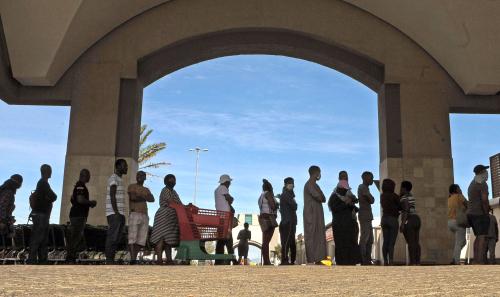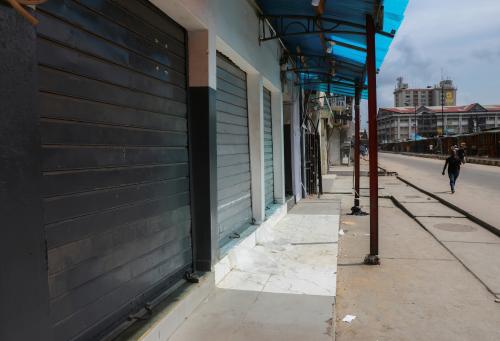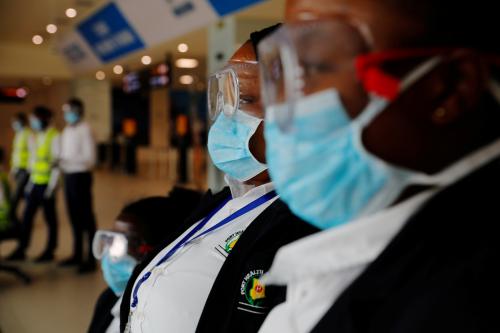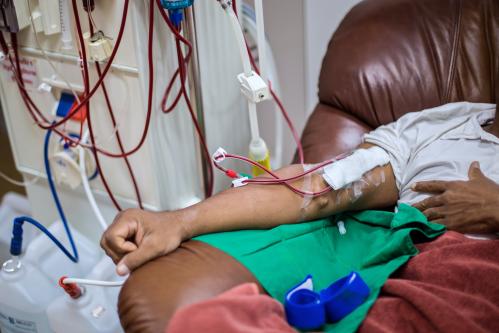The World Health Organization (WHO)’s March 11 recognition of COVID-19 as a global pandemic has removed any doubt about the threat that the virus poses to every country in the world. The virus has now been detected in 152 countries, with more than 180,000 infected and more than 7,000 killed. Though Africa remains one of the regions with the fewest cases, the number of countries affected has increased over the past week. As of this writing, nearly 450 cases have been reported in 30 countries, concentrated in northern Africa and South Africa, with 10 deaths reported.
While the relatively low number of cases on the continent so far is good news, African policymakers should not be complacent. They should instead use this window of opportunity to take decisive steps to protect their citizens and economies from the pandemic.
To achieve these goals, we recommend a three-step approach: (1) contain the spread of the virus; (2) swiftly treat identified cases; and (3) cushion the economy from the effects of the pandemic. If these measures are implemented, the human casualties will be limited, and Africa’s economic growth will decline by around 1 percentage point or possibly less. If, on the other hand, the measures to contain the pandemic are not swift, the number of deaths will soar, and economic growth could drop by 2.1 percentage points or more.
Contain the spread of the virus
Because many African countries have relatively weak health care systems, proactive measures to prevent the spread of the virus will be critical. Countries should step up campaigns to educate the public on best practices, including promoting good hygiene and social distancing, discouraging large public gatherings, and encouraging employers to protect the jobs of employees who require quarantine or treatment. Campaigns should elicit the help of religious and civil society leaders for maximum effect. Rwanda, which has set up portable sinks throughout public areas to encourage handwashing in its capital, Kigali, provides a good example of how some of these measures can be undertaken.
In addition, governments should suspend all international travel to or from the most-affected countries, and quarantine citizens who have traveled to or through those areas for at least two weeks. Several countries, including Ghana, Kenya, Morocco, Senegal, and South Africa, have already taken these measures. Others should emulate them.
Ensure health systems are prepared to treat those affected
The 2014 Ebola crisis—which lasted two and a half years and resulted in more than 28,600 cases and 11,325 deaths—exposed the inadequacy of health care systems in Africa. Although important lessons were learned from past outbreaks, and health systems have been strengthened since then, there are still critical gaps in preparedness. Governments and health specialists must work in collaboration with the WHO and other partners to ensure that hospitals and clinics have adequately trained personnel and enough capacity for testing and treating the virus. Both Germany and South Korea have developed fast, extensive, and free testing mechanisms that are good examples of what efficient testing looks like.
Prepare to cushion the economic effect of the pandemic
Africa started 2020 with a positive economic outlook, as outlined in AGI’s annual Foresight Africa report. However, the COVID-19 pandemic will have significant effects on economies in several countries as trade, tourism, remittances, financial markets, and consumer and business sentiment are all disrupted.
Commodity prices and trade
The late 2014 drop in oil prices contributed to a significant decline in GDP growth for sub‑Saharan Africa from 5.1 percent in 2014 to 1.4 percent in 2016. During that episode, crude oil prices fell by 56 percent over seven months. The current decline in oil prices has been far more rapid, with some analysts projecting even more severe price declines than in 2014. Already, crude oil prices have fallen by 54 percent in the three months since the start of the year, with current prices falling below $30 per barrel. Non-oil commodity prices have also declined since January, with natural gas and metal prices dropping 30 percent and 4 percent, respectively.
Because of these price drops, the largest disruption to trade will be for commodity-sensitive economies, with Algeria, Angola, Cameroon, Chad, Equatorial Guinea, Gabon, Ghana, Nigeria, and the Republic of the Congo among the most affected. Oil exports range from 3 percent of GDP in South Africa to as high as 40 percent in Equatorial Guinea and are a key source of foreign exchange earnings. Furthermore, the shock comes at a particularly bad time for three of the largest economies—Angola, Nigeria, and South Africa—which already had weak growth outlooks, with South Africa already in recession. Nigeria is now facing U.S. dollar shortages due to the oil price crash and is expected to devalue its currency by 10 percent by the end of June. We expect similar stresses to surface in some other countries.
Tourism and remittances
Tourism, an important sector of economic activity for many countries, will be heavily affected by COVID-19 as countries begin to place restrictions on travel and encourage social distancing. The sector contributes over 10 percent of GDP in the Seychelles, Cape Verde, and São Tomé and Príncipe, and over 5 percent in The Gambia, Morocco, Mauritius, Tunisia, Lesotho, Madagascar, Egypt, and Rwanda. Tourism employs more than a million people in each of Nigeria, Ethiopia, South Africa, Kenya, and Tanzania, and tourism employment comprises more than 20 percent of total employment in Seychelles, Cape Verde, São Tomé and Príncipe, and Mauritius. In past crises, including the 2008 financial crisis and the 2014 commodity price shock, African tourism experienced losses of up to $7.2 billion.
Similarly, with economic activity in the doldrums in many advanced and emerging market countries, remittances to Africa could experience significant declines. Remittances as a share of GDP exceed 5 percent in 13 African countries, and range as high as 23 percent in Lesotho and more than 12 percent in Comoros, The Gambia, and Liberia.
Tighter financial conditions
The COVID-19 pandemic has severely disrupted financial markets, with equity indices in major economies dropping significantly. Equity markets plunged by over 20 percent in the U.S. and experienced the largest single-day drop of the Dow since “Black Monday” in 1987. African equity markets have not been immune, with S&P All Africa index returns dropping by 30 percent since the beginning of the year, and large drops in Egypt, South Africa, Kenya, Mauritius, and Nigeria.
The pullback from African markets as well as a projected decline in export revenues has led to depreciations of local currencies. These exchange rate depreciations will push up local inflation and trigger monetary policy and financial tightening. In addition, exchange rate depreciations inflate local currency values of foreign currency debt and make debt management and servicing more challenging, a particular threat in Africa, where an estimated one-third of countries are either in or at high risk of debt distress.
Additionally, the risk-off sentiment in global markets will push up the cost of external financing for African countries. According to Euromoney, the yield on Nigeria’s 2031 eurobond nearly doubled from 6.8 percent on February 21 to 12.1 percent on March 13. Similarly, the yield on Ghana’s 2029 eurobond shot up by 400 basis points to 11 percent, and that for Angola doubled to 14.2 percent. Furthermore, investor pull will cause delays in planned eurobond issuance by several countries. Already, Nigeria has announced a delay in the issuance of $3.3 billion eurobond, and Côte d’Ivoire, Benin, and South Africa are all expected to postpone issuances until markets stabilize. These delays will pose challenges for public finances in several countries.
Deteriorated consumer and business sentiment
The other channel through which COVID-19 will affect economic activity is through consumer and business sentiment. According to a survey by KASI Insights, in seven African countries, consumer sentiment for February dropped over COVID-19 concerns, a signal of reductions in consumer spending. Faced with lower and uncertain demand, business confidence will decrease and cause declines in investment.
Effect on economic growth
We estimate that the COVID-19 related disruptions outlined above will lower sub-Saharan Africa’s GDP growth in 2020 to between 1.5 percent and 2.5 percent, down from the projected 3.6 percent pre-COVID-19 projections. Under a scenario where African governments quickly take the appropriate steps to contain the spread of the virus and global conditions stabilize, the regional GDP growth will decline by around 1 percentage point, to 2.5 percent. In a scenario where the responses are not swift, the pandemic lasts longer, and global conditions take more time to normalize, the disruption will be more severe, resulting in a 2.1 percentage point reduction in growth, to 1.5 percent.
While the health of those affected by the virus is clearly of paramount concern, business owners, consumers, and governments must also prepare for the pandemic’s economic effects to ensure that their countries emerge from the crisis stronger than before. Strong measures taken in several—but not all—countries are positive steps which will help reduce the human and economic impact of the virus in Africa.
The global community must come together to collaborate, coordinate, share lessons learned, and assist each other to combat the pandemic. Until every country is safe, no country will be safe. The outbreak should serve to highlight the extent to which countries are interconnected and interdependent and should be a call to strengthen global institutions and the global governance system.
The Brookings Institution is committed to quality, independence, and impact.
We are supported by a diverse array of funders. In line with our values and policies, each Brookings publication represents the sole views of its author(s).











Commentary
Strategies for coping with the health and economic effects of the COVID-19 pandemic in Africa
March 18, 2020